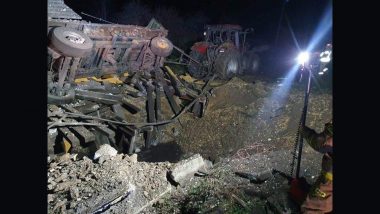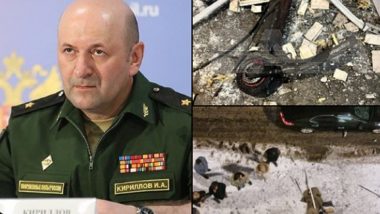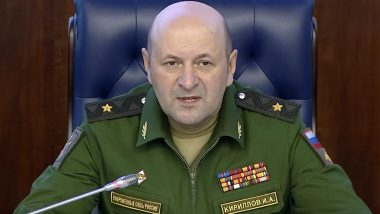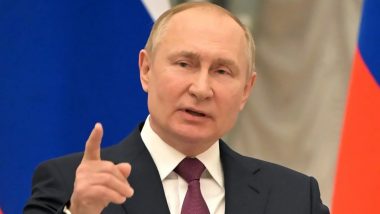Przewodow, November 16: US President Joe Biden and other Western backers of Ukraine threw their weight Wednesday behind an investigation into why and how a missile that Poland said was Russian-made came down in Polish farmland, killing two people, when Russia was savaging the Ukrainian power grid with missiles and exploding drones.
Biden said it was “unlikely” that Russia fired the missile but added, “we'll see," and vowed: “I'm going to make sure we find out exactly what happened." Polish President Andrzej Duda went further, saying there are no signs that the blast was a deliberate attack. Russian Missile, Intended for Ukraine, Hits Village in Poland; Two Killed.
The missile came down on Tuesday near Poland's border with Ukraine. Three US officials said preliminary assessments suggested it was fired by Ukrainian forces at an incoming Russian one. The officials spoke on condition of anonymity because they weren't authorised to discuss the matter publicly. Poland: PM Mateusz Morawiecki Calls Emergency Meeting After Two People Killed in Russian Missile Attack at Ukraine Border.
That assessment and Biden's comments at the Group of 20 summit in Indonesia contradicted information earlier Tuesday from a senior US intelligence official who told The Associated Press that Russian missiles crossed into Poland.
The Kremlin on Wednesday denounced Poland's and other countries' reaction to the missile incident as “hysterical” and, in rare praise for a US leader, hailed the “restrained and much more professional” reaction of the US.
“We have witnessed another hysterical, frenzied, Russophobic reaction that was not based on any real data,” Kremlin spokesman Dmitry Peskov told reporters on Wednesday.
He added that “immediately, all experts realised that it could not have been a missile linked to the Russian armed forces,” and pointed to a “restrained, much more professional reaction” of the US and its president, Joe Biden.
In Brussels, NATO countries were coming together on Wednesday for emergency talks. There was no immediate proof that Tuesday's blast was a deliberate, hostile attack on NATO member Poland that could trigger the alliance's provisions for a collective military response.
Russia denied any involvement. But Ukraine was under countrywide Russian bombardment Tuesday by barrages of cruise missiles and exploding drones, which clouded the picture of what exactly happened in Poland and why.
In Europe, NATO members Germany and the UK were among those stressing the need for a full investigation. German Chancellor Olaf Scholz warned against jumping to conclusions “in such a serious matter.” Still, Scholz and others also laid overall but not specific blame on Russian President Vladimir Putin's invasion of Ukraine.
“This wouldn't have happened without the Russian war against Ukraine, without the missiles that are now being fired at Ukrainian infrastructure intensively and on a large scale,” Scholz said. UK Prime Minister Rishi Sunak echoed that assessment, saying: “This is the cruel and unrelenting reality of Putin's war.”
Ukrainian President Volodymyr Zelenskyy called it “a very significant escalation." On the other end of the spectrum, China was among those calling for calm and restraint. The Polish government said it was investigating and raising its level of military preparedness. On Twitter, Biden promised “full US support for and assistance with Poland's investigation."
A statement from the Polish Foreign Ministry identified the weapon as being made in Russia. Duda, however, was more cautious, saying that it was “most probably” Russian-made but that its origins were still being verified. “We are acting with calm," Duda said. “This is a difficult situation.”
Former Soviet-bloc country Ukraine maintains stocks of Soviet- and Russian-made weaponry, including air-defence missiles, and has also seized many more Russian weapons while beating back the Kremlin's invasion forces.
Ukrainian air defences worked furiously against the Russian assault Tuesday on power generation and transmission facilities, including in Ukraine's western region that borders Poland. Ukraine's military said 77 of the more than 90 missiles fired were brought down, along with 11 drones.
Damage from the aerial assault in Ukraine was extensive and swaths of the country were plunged into darkness. Zelenskyy said about 10 million people lost power but tweeted overnight that 8 million were subsequently reconnected, with repair crews labouring through the night. Previous Russian strikes had already destroyed an estimated 40 per cent of the country's energy infrastructure.
NATO Secretary-General Jens Stoltenberg called the meeting in Brussels of the alliance's envoys. The UN Security Council also planned to meet Wednesday for a previously scheduled briefing on the situation in Ukraine.
Poland's statement didn't address whether the strike could have been a targeting error or if the missile could have been knocked off course by Ukrainian defences.
Poland and NATO used language that suggested they weren't treating the missile blast as an intentional Russian attack, at least for now. A NATO statement called it a “tragic incident.” If Russia had deliberately targeted Poland, it would risk drawing NATO into the conflict.
Polish media reported that the strike took place in an area where grain was drying in Przewodow, a village near the border with Ukraine. Russia's Defence Ministry denied being behind “any strikes on targets near the Ukrainian-Polish border” and said in a statement that photos of purported damage “have nothing to do” with Russian weapons.
Polish Foreign Minister Zbigniew Rau summoned the Russian ambassador and “demanded immediate detailed explanations,” the government said. The Russian bombardment also affected neighbouring Moldova. It reported massive power outages after the strikes in Ukraine disconnected a power line to the small nation.
The assault killed at least one person in a residential building in Ukraine's capital, Kyiv. It followed days of euphoria in Ukraine sparked by one of its biggest military successes — the retaking last week of the southern city of Kherson.
With its battlefield losses mounting, Russia has increasingly resorted to targeting Ukraine's power grid, seemingly hoping to turn the approach of winter into a weapon by leaving people in the cold and dark.
(This is an unedited and auto-generated story from Syndicated News feed, LatestLY Staff may not have modified or edited the content body)









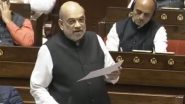



 Quickly
Quickly








